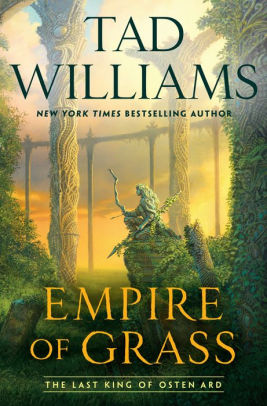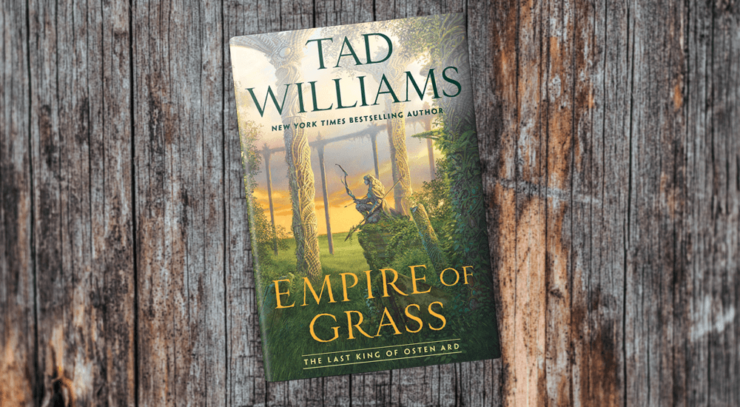When I first learned that Tad Williams was planning to revisit the world of Memory, Sorrow, and Thorn in a new trilogy, I was immediately a bit skeptical. The first trilogy was so deep, thrilling, and expansive that I assumed there wouldn’t be any story left to tell. At best, I feared we’d get a pale rehash of that fantasy epic; at worst, we might be in for a Crimes of Grindelwald situation, with a new installment uneven enough to cast a pall over the entire franchise. Could the world of Osten Ard, with its deconstructions and reconstructions of fantasy’s best-known tropes, still matter in a literary landscape that takes far more cues from Martin and Sanderson than from Tolkien and Lewis?
I should have taken my own advice. Earlier this year, I argued that in the age of hopepunk, Osten Ard has never been more relevant. Empire of Grass, the second installment in the Last King of Osten Ard trilogy, drives that relevance home with Williams’s usual relentless creativity. I’ve never been happier to be wrong. There’s still one more book to go—The Navigator’s Children—but whatever happens in that final volume, these new installments have achieved something special.
[Some spoilers below for the first two volumes of the Last King of Osten Ard Trilogy]
Empire of Grass picks up directly after the previous installment, The Witchwood Crown, revisiting and developing the storylines that book introduced. Prince Morgan, grandson of King Simon and Queen Miriamele, is fighting for his life in the massive Aldheorte Forest, while his grandmother struggles to make peace between warring factions in the south. Nezeru, the half-Norn warrior, must escort a captive dragon to Queen Utuk’ku as part of her plan to take revenge on all mortals. Meanwhile, the king of Hernystir is up to something shifty, there’s a traitor behind the walls of the Hayholt, and (as the latest book’s title suggests), the people of the Thrithings grasslands are getting organized behind an enigmatic new leader.
Wisely, Williams hasn’t tried to recreate the slow ramp-up from Memory, Sorrow, and Thorn, where Simon was the only POV character for a great deal of the first book. The Witchwood Crown threw us directly into a crisis as it gathered speed in every corner of the world, like little rivulets feeding a great flood. It did such a thorough job of laying groundwork that Empire of Grass is allowed to be wonderfully propulsive—this is a book where things bloody well happen, and no character is spared.
Much like another long-awaited sequel trilogy, the new Star Wars films, the next generation of characters shoulder an increasing share of the story. It’s great, of course, to catch up with Simon, Miri, Binabik, Tiamak, and Eolair, but in further proof that he knows exactly what he’s doing, Williams doesn’t force them to carry the action. I was taken with Morgan in The Witchwood Crown, and admired how Williams made such an unpleasant person (a prickly, impulsive teenage alcoholic) so wholly sympathetic by showing exactly how he became the way he is. In Empire of Grass, Morgan gets the chance to shed his irresponsible surface layer and come into his own.
Two more characters introduced in the previous book, Nezeru and her mortal companion Jarnulf, have one of the most compelling dual arcs in recent memory, as they smash into each other and careen off in wildly different directions: while she begins questioning her entire belief system under his interrogations, he becomes ever more devoted to his own fatal mission, and dismissive of his own life. By the time we notice the shift that’s going on, they’ve essentially swapped places.
We’re also properly introduced to Tanahaya, the series’s first narrator from the ethereal forest-dwelling Sithi, who spent most of the previous book in a coma. Other Witchwood Crown newcomers like Fremur, Jesa, Aelin, and Tzoja also get more to do, here. One narrator we thought we knew—Simon’s chancellor Pasevalles, whose monstrous nature was revealed in the last book’s most shocking twist—flexes his muscles as a truly threatening villain. And on top of all that, we get some tantalizing new hints about the origins of the Sithi and Norns (who are all but confirmed to have once been spacefarers), plus suggestions that the overlooked Tinukeda’ya are far more important than anyone has guessed (suggestions bolstered by the reference in the intriguing title of the series’ final book).
It all adds up to a complex juggling act that a lesser storyteller might fumble in any number of ways. But Williams keeps his balls in the air so masterfully you begin to wonder if he even knows that what he’s doing is supposed to be hard. Not one of Empire of Grass‘s plot threads ever feels shortchanged, nor any of its hundreds of characters unwelcome.
Part of my full-throated recommendation comes from the fact that this feels like the most expansive work in the Osten Ard universe so far. While the impending doom of Memory, Sorrow, and Thorn kept the tensions high, it also meant the characters were forced to fight for their lives on almost every page. Empire of Grass allows for more varied kinds of action to spread out over a wider canvas. It’s an absolute joy to see a saga of knife-edge diplomacy, a coming-of-age tale, a missing-person mystery, a messianic origin story, and a domestic suspense thriller coexist so seamlessly between the same two covers.
For all that, though, its most impressive alchemy isn’t just dramatic, but thematic. On the surface, The Last King of Osten Ard is about tying up the two biggest loose ends left over from Memory, Sorrow, and Thorn: the survival of the vengeful Utuk’ku, and a dramatic prophecy concerning the twin children of Prince Josua. Yet it’s so much more than just narrative housekeeping—it’s a fantastic meditation on the very nature of endings.
Consider how Memory, Sorrow, and Thorn wrapped up. Some readers were disappointed by what they saw as a clichéd resolution, with Simon learning of his secret royal heritage just in time to marry his true love and take the throne. I wasn’t one of those readers, but I could understand where they were coming from.
But then The Last King of Osten Ard rolls around, and thirty years later, we learn that Simon and Miri’s happily-ever-after…really wasn’t. Oh, they’ve had plenty of happiness—the achingly beautiful and real portrayal of their long marriage was one of the best parts of The Witchwood Crown—but the eucatastrophe of the original trilogy didn’t quell the desire for vengeance festering in every corner of the setting.
Buy the Book


Empire of Grass
In Empire of Grass, Williams weaves themes from every prior installment into a unified message that adds depth and weight to the whole of the story. We’ve known for a while that he wants us to sympathize with his villains: the archvillain of the previous trilogy was defeated by a moment of selfless empathy. Empire of Grass invites us to sympathize with the almost unfathomable Utuk’ku, as we learn that she has spent centuries training a succession of singers to perfectly imitate her dead son. Her endless life makes it impossible for her to understand that the mortals she’s trying to take vengeance on have been dead for generations.
So if everyone is at least a little sympathetic, is there a Big Bad at all? If there’s any ultimate evil in Osten Ard, it’s the inability to let things go. In the third act, an original and chilling new villain describes it to Miriamele using the untranslatable word vindissa: vengeance as an immutable law of the universe. Utuk’ku wants vindissa against the mortals. Pasevalles wants vindissa against the royals who failed to help him when he was left penniless on the streets. Unver and the Thrithings clans demand vindissa against the Nabbanai building settlements on their land. And so on.
Not even the good guys are immune. Miri suffers as she can’t let go of her mission in Nabban, and she and Simon clearly haven’t yet dealt with their son’s mysterious death. Eolair can’t let go of his sense of duty. Morgan clings to his anger at his grandparents, Vorzheva to her anger at the vanished Josua, and Jarnulf to his mission, to the point of dismissing the value of his own life.
Yet single-minded determination isn’t all bad: it would be hard not to agree at least a little with Unver the Thrithings-lord’s complaints, for example, and Jesa and Tzoja show an uncomplicated yet ironclad devotion to the children they raise. As always, Tad Williams and Osten Ard are not about providing easy answers or straight paths. To me, it’s very satisfying (not to mention entirely in character) that Williams chose to complicate his own “perfect ending” with a sequel that’s all about how nothing ever really ends.
I want to conclude by making certain none of you make my mistake. If you loved Memory, Sorrow, and Thorn but held off on reading The Witchwood Crown out of fear it would tarnish its predecessors, fear no longer. Read it. Then read Empire of Grass. With this book, The Last King of Osten Ard has achieved the greatest possible feat for a sequel: that is, I can no longer imagine the originals without it.
The Last King of Osten Ard books are available from DAW.
Samuel Chapman is a writer who lives in Portland, OR with his girlfriend, a lot of smoked fish, and a perpetual drizzle. His short fiction has appeared in Metaphorosis, Buckshot,and the anthologies Terra! Tara! Terror! and Score, and more of his thoughts can be found on his blog, “To Find the Colors Again.” He also accepts freelance jobs on his professional website, and tweets Christmas crossover crises and unsolicited Sly Cooper quotes at @SamuelChapman93.










